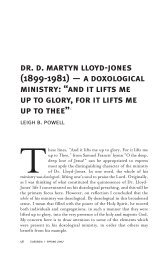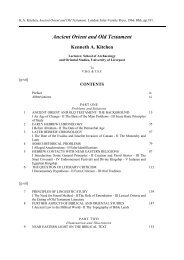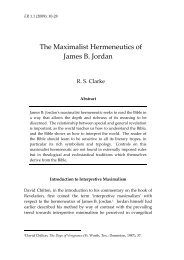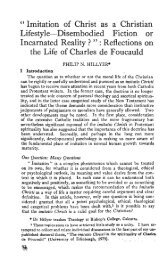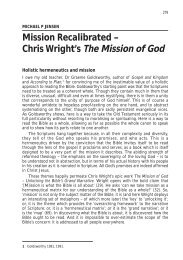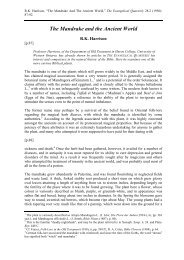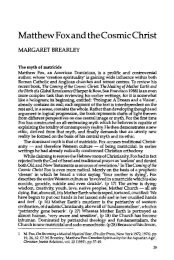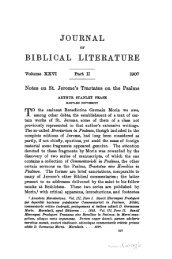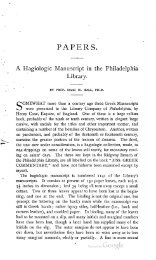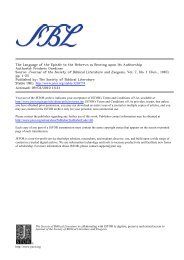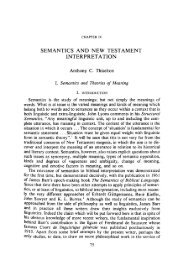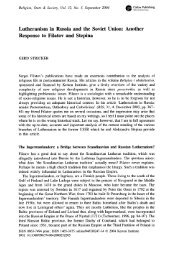"A Reformation & Revival Journal Interview with Diane Langberg ...
"A Reformation & Revival Journal Interview with Diane Langberg ...
"A Reformation & Revival Journal Interview with Diane Langberg ...
You also want an ePaper? Increase the reach of your titles
YUMPU automatically turns print PDFs into web optimized ePapers that Google loves.
60 THE ART OF BEARING BURDENS<br />
THE ART OF BEARING BURDENS 61<br />
As we are steeped in God's grace toward us, we will extend<br />
that graciousness to others. We who have received grace upon<br />
grace upon grace will willingly, delightedly extend that same<br />
grace to those who suffer. And we will know that when we<br />
find ourselves ungracious, judgmental, selfish or harsh in any<br />
way, that it is a reflection of our failure to know him in some<br />
way, or to love him in some way, rather than a problem <strong>with</strong><br />
the person who sits before us. If I am impatient <strong>with</strong> you it is<br />
not because you are slow (though you may be), but rather<br />
because my heart is full of impatience. Every encounter <strong>with</strong> a<br />
lack of grace in our hearts will have the effect then of sending<br />
us back to our knees to know him yet even more.<br />
Knowing him who is truth is what will keep us grounded<br />
in the truth. Sitting <strong>with</strong> suffering has great potential to keep<br />
us from truth. One of the ways this can happen is that we lose<br />
sight of God and who he is. We begin to believe that he is not<br />
good. We begin to believe that he is not love. You cannot sit<br />
<strong>with</strong> the sexual abuse of little girls, a baby dying from Aids, a<br />
battered wife, parents who are grieving over the loss of a child,<br />
the erosion of a life by cancer and a thousand other things<br />
<strong>with</strong>out asking questions. If you do not ask questions, I doubt<br />
you have truly entered into the suffering of others. Suffering<br />
rarely makes sense. Oh, we work very hard to try to make<br />
sense out of it. We write books on why it happens and the<br />
good that comes out of it. I often think that the ability to most<br />
easily explain suffering is the clearest indication of never having<br />
suffered. However, if we look suffering full in the face and<br />
do not truly know Christ, it will end up in our slandering<br />
him, hating him. And so we must continually seek the one<br />
who is truth, reminding ourselves of his truth, when all the<br />
evidence screams to the contrary.<br />
The second aspect of knowing him who is truth is that we<br />
are continually hindered from taking ourselves so seriously.<br />
We know the truth of whom we are, sinners saved by grace<br />
and who, like our Master, we have been called to serve. Our<br />
self-importance, our certainty that our way, our system is<br />
better, end up falling by the wayside, replaced instead by the<br />
desire to see ourselves in truth before him. It is only this that<br />
will keep us from deceiving ourselves. Otherwise we will end<br />
up pushing on others, saying it is for their good, when in reality<br />
it is because of our discomfort <strong>with</strong> their pain. We will insist<br />
someone get their act together because they are hurting us or<br />
making us feel incompetent, all the while fooling ourselves<br />
into thinking it is for their benefit. It is only as we continually<br />
sit before him who is truth, that we will see ourselves in truth,<br />
we will call the things we see in ourselves by their right name<br />
and therefore be enabled to walk before others in truth.<br />
Paul first gives us our grounding, "that I may know him".<br />
We would be foolish to attempt to bear the burdens of others<br />
<strong>with</strong>out a vital relationship <strong>with</strong> Jesus. Paul then speaks of<br />
"the power of his resurrection". What does that have to do<br />
<strong>with</strong> the bearing of burdens? The resurrection is about life<br />
swallowing up death, it is the culmination of redemption.<br />
Paul says in his letter to the Corinthians, "If Christ has not<br />
been raised then our preaching is in vain, your faith also is in<br />
vain" (1 Corinthians 15:14). If Christ is not raised your burden<br />
bearing is in vain, for what would be its purpose? You<br />
would relieve some suffering momentarily. More would<br />
immediately take its place. You would be offering healing to<br />
those who will only die. But if Christ be raised? Then there is<br />
hope. Then there is purpose. That is what Paul says at the end<br />
of the fifteenth chapter -"Therefore, my beloved brothers, be<br />
steadfast, immovable, always abounding in the work of the<br />
Lord, knowing that in the Lord your labor is not in vain"<br />
(1 Corinthians 15:58). Burden bearing is not in vain because<br />
of the resurrection. And that is not simply because of our eternal<br />
hope, though of course that is part of it. But keep in mind<br />
that the eternal in anything is the unseen, the spiritual. Whenever<br />
we encounter the suffering of another in a way that glorifies<br />
God, then that encounter belongs to the things that are<br />
eternal. No matter the outcome, when the simplest thing is<br />
done for the glory of God it belongs to the eternal. It is the<br />
spiritual that is deathless, that abides.<br />
I believe however, that knowing the power of his resurrection<br />
goes much further than that. We are not simply to know<br />
and believe the fact of his resurrection, but to experience the



